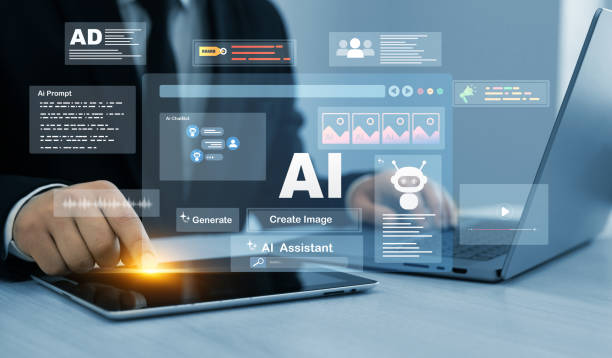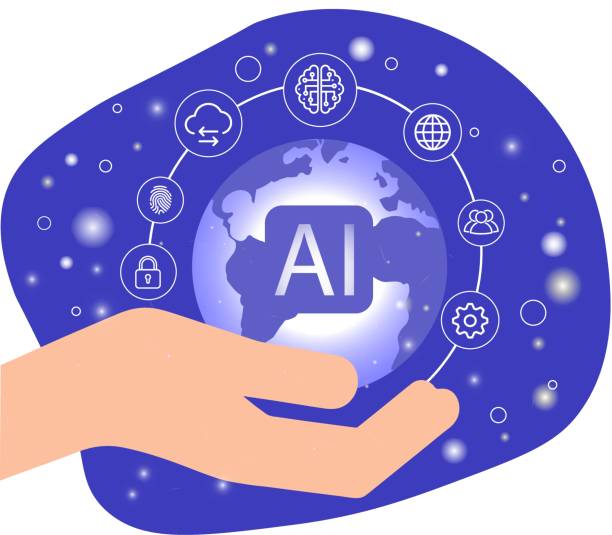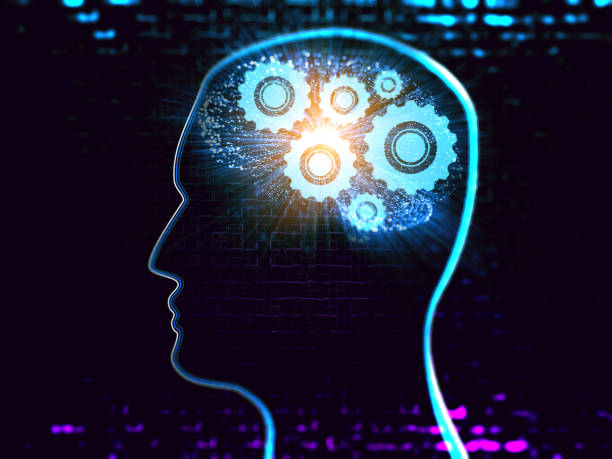What is Artificial Intelligence and How Does it Work?

What is Artificial Intelligence and How Does it Work?
#Artificial_Intelligence (AI) is a branch of computer science dedicated to building machines that can perform tasks typically requiring human intelligence.
These tasks include learning, reasoning, problem-solving, perception, and natural language understanding.
AI is a broad concept that encompasses various sub-fields such as machine learning, deep learning, and natural language processing.
This field is currently employed in many industries such as healthcare, finance, automotive, and manufacturing.
Generally, AI analyzes data and identifies patterns using complex algorithms and mathematical models.
These patterns help machines make decisions, predict, and learn.
For instance, an AI system can diagnose diseases by analyzing medical data or detect fraud by examining financial data.
For a better understanding of artificial intelligence, it is advisable to refer to this Wikipedia link.
AI is essentially an imitation of human #intelligence processes performed by machines.
This includes learning (acquiring information and rules for using information), reasoning (using rules to reach conclusions), and self-correction (automatic error correction).
The applications of AI are very extensive and include recommendation systems (like Netflix and Amazon), self-driving cars, facial recognition, and many other cases.
Are you tired of losing business opportunities due to not having a professional corporate website?
Rasaweb, with its professional corporate website design, helps you:
✅ Build a powerful and reliable image for your brand
✅ Convert website visitors into loyal customers
⚡ Get a free consultation now!
Types of Artificial Intelligence: Approaches and Categories
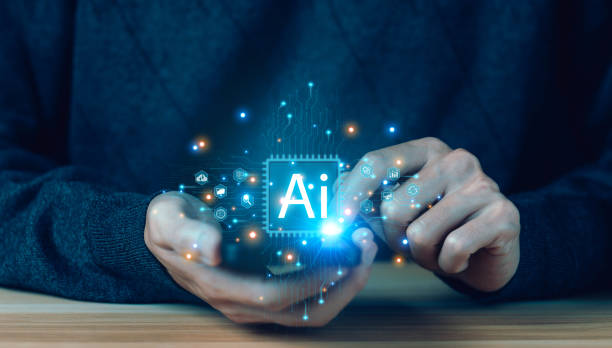
Types of Artificial Intelligence: Approaches and Categories
Artificial intelligence can be categorized based on different capabilities and approaches.
In terms of capability, AI is broadly divided into two categories: #Weak_AI (Narrow AI) and Strong AI (General AI).
Weak AI is designed to perform a specific task and excels in that particular domain.
Examples include facial recognition systems and recommendation systems.
In contrast, Strong AI is capable of performing any task that a human can.
This type of AI is still in research stages and has not yet been fully realized.
From an approach perspective, AI is divided into several categories.
Machine learning is one of the main approaches where machines learn from data.
Deep learning is a subset of machine learning that uses artificial neural networks to analyze data.
Natural Language Processing (NLP) helps machines understand and generate human language.
Expert systems are another type of AI that simulate the knowledge of experts in a specific field.
In this article, you can study the types of artificial intelligence.
Each of these approaches and categories has its own advantages and disadvantages and is chosen depending on the application type.
For instance, deep learning is highly suitable for image and sound analysis, while expert systems are used for solving complex problems in specialized fields such as medicine and law.
Applications of Artificial Intelligence in Various Industries
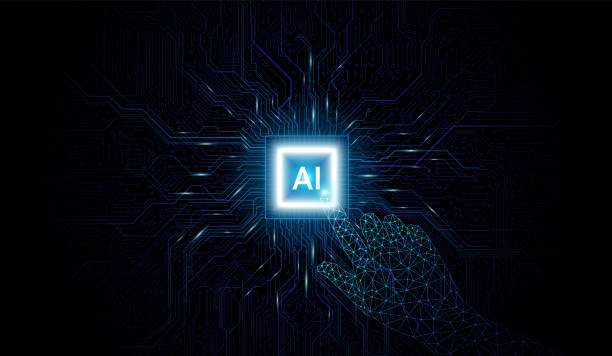
Applications of Artificial Intelligence in Various Industries
Artificial intelligence is transforming various industries and has widespread applications.
In #healthcare, AI can assist in diagnosing diseases, developing drugs, and providing personalized care.
In the financial industry, AI is used for fraud detection, risk management, and providing financial advisory services.
In the automotive industry, AI helps develop self-driving cars, improve safety, and increase fuel efficiency.
Also, in manufacturing, AI is used for process optimization, cost reduction, and product quality improvement.
In marketing and sales, AI can assist in analyzing customer behavior, offering personalized suggestions, and improving conversion rates.
In education, AI can help provide personalized education, assess student performance, and develop educational content.
In transportation, AI can contribute to route optimization, traffic reduction, and improved safety.
In summary, #AI_applications are very broad and diverse, with new applications being discovered every day.
This technology is reshaping many industries and holds great potential for improving human lives.
For more information, you can refer to this link.
| Industry | Applications |
|---|---|
| Healthcare | Disease diagnosis, drug development, personalized care |
| Finance | Fraud detection, risk management, financial consulting |
| Automotive | Self-driving cars, safety, fuel efficiency |
| Manufacturing | Process optimization, cost reduction, quality improvement |
Machine Learning and Deep Learning: Differences and Applications

Machine Learning and Deep Learning: Differences and Applications
Machine Learning (ML) and Deep Learning (DL) are two related but distinct concepts within the field of artificial intelligence.
#Machine_Learning enables machines to learn from data without explicit programming.
This process involves using algorithms to analyze data, identify patterns, and make predictions.
Deep learning is a subset of machine learning that utilizes artificial neural networks with many (deep) layers to analyze data.
Deep neural networks are capable of identifying more complex patterns in data.
The main difference between machine learning and deep learning lies in how features are extracted from data.
In traditional machine learning, engineers manually extract features, and then machine learning algorithms use these features for learning.
In deep learning, deep neural networks automatically extract features from data.
This makes deep learning more suitable for solving more complex problems such as image recognition and natural language processing.
#Applications_of_machine_learning and deep learning are very extensive.
Machine learning is used in areas such as spam email filtering, recommendation systems, and fraud detection.
Deep learning is employed in fields such as image recognition, voice recognition, natural language processing, and self-driving cars.
For more information on the differences between these two concepts, you can refer to this link.
Does your current website inspire the trust that potential customers should have in your business? If the answer is no, it’s time to have a professional and impactful corporate website with Rasaweb.
✅ Fully customized design tailored to your brand identity
✅ Increased lead generation and business credibility in the eyes of customers⚡ Contact us for a free consultation!
Natural Language Processing (NLP): How Do Computers Understand Human Language?

Natural Language Processing (NLP): How Do Computers Understand Human Language?
Natural Language Processing (NLP) is a branch of artificial intelligence that enables computers to understand and generate human language.
NLP involves a set of techniques and algorithms used for analyzing, interpreting, and generating text and speech.
NLP is used in many applications such as machine translation, sentiment analysis, chatbots, and voice assistants.
#Natural_language_processing helps machines understand the meaning of words, sentences, and texts, and provide appropriate responses.
One of the main challenges in NLP is ambiguity in human language.
A word or sentence may have different meanings, and its correct understanding requires contextual comprehension and general knowledge.
NLP uses various techniques such as syntactic analysis, semantic analysis, and contextual analysis to address this problem.
Additionally, NLP utilizes language models to predict subsequent words and sentences in a text.
#NLP_applications are very extensive.
In machine translation, NLP enables computers to translate texts from one language to another.
In sentiment analysis, NLP allows computers to detect emotions present in a text.
In chatbots, NLP enables computers to communicate with humans in natural language.
For a better understanding of NLP, you can refer to this link.
Challenges and Limitations of Artificial Intelligence

Challenges and Limitations of Artificial Intelligence
Despite significant advancements, artificial intelligence still faces many challenges and limitations.
One of the main challenges is the need for large amounts of high-quality data to train #AI_models.
Deep learning models, in particular, require vast amounts of data to learn complex patterns.
Furthermore, data collection and preparation can be time-consuming and costly.
Another challenge is the interpretability of AI models.
Some models, especially deep neural networks, act as black boxes, making it difficult to understand how they arrived at a particular decision.
Another limitation of AI is the ability to generalize knowledge from one domain to another.
An AI model trained for a specific task may not perform well in a similar task.
Furthermore, #artificial_intelligence still struggles with understanding and solving complex problems that require general knowledge and reasoning.
In addition, ethical issues related to AI, such as privacy, bias, and accountability, are significant challenges in this field.
For more information, you can refer to this link.
Issues related to #AI_security are also a major challenge.
AI models can be vulnerable to cyberattacks, and attackers can alter the model’s behavior by modifying input data.
Furthermore, the use of AI in military and security systems raises serious concerns regarding safety and control.
The Future of Artificial Intelligence: Predictions and Potential Impacts

The Future of Artificial Intelligence: Predictions and Potential Impacts
The future of artificial intelligence appears very bright, and this technology is predicted to bring significant transformations to human lives and various industries in the coming years.
It is expected that #artificial_intelligence will play a more crucial role in fields such as healthcare, education, transportation, and manufacturing.
Self-driving cars, smart voice assistants, and advanced disease diagnostic systems are just a few examples of future AI applications.
With the advancement of AI, many jobs are expected to become automated, reducing the need for human labor in some industries.
This could lead to major changes in the job market and the need for workforce retraining.
On the other hand, #artificial_intelligence can create new job opportunities in fields such as software development, data analysis, and AI engineering.
| Field | Potential Impacts of AI |
|---|---|
| Healthcare | More accurate disease diagnosis, personalized treatments |
| Education | Personalized education, automated assessment |
| Transportation | Self-driving cars, traffic reduction |
| Manufacturing | Increased automation, cost reduction |
Advancements in artificial intelligence require attention to ethical and social issues.
Ensuring privacy, preventing discrimination, and establishing legal frameworks for accountability are among the matters that need consideration.
To learn more about the future of artificial intelligence, refer to this link.
AI Tools for Developers

AI Tools for Developers
Developers use various tools and libraries to build and develop artificial intelligence applications.
#Python is one of the most popular programming languages for AI, and libraries like TensorFlow, PyTorch, and scikit-learn provide powerful tools for machine learning and deep learning.
TensorFlow is an open-source library developed by Google and used for building and training deep learning models.
PyTorch is another open-source library developed by Facebook and used for deep learning research and application development.
scikit-learn is an open-source library used for traditional machine learning, offering various algorithms for classification, regression, and clustering.
In addition to these libraries, other tools exist for #AI_development.
Jupyter Notebook is an interactive development environment that allows developers to combine code, text, and images in a single document.
Docker is a virtualization platform that enables developers to package their applications in an isolated environment and easily run them on various systems.
AWS, Azure, and Google Cloud are also cloud platforms that offer various services for developing and deploying AI applications.
AI tools help developers quickly and easily develop and test artificial intelligence applications.
These tools provide functionalities such as model training, model performance evaluation, and model deployment.
For more information about the necessary AI tools, you can refer to this link.
How much does losing business leads due to an unprofessional website cost you? Solve this problem forever with a professional corporate website design by Rasaweb!
✅ Increase credibility and trust of potential customers
✅ Easier attraction of new business leads
⚡ Get a free consultation now!
Ethical and Social Issues Related to Artificial Intelligence

Ethical and Social Issues Related to Artificial Intelligence
The development and use of #artificial_intelligence raise important ethical and social issues that need to be addressed.
One of these issues is privacy.
AI systems often require large amounts of personal data to learn complex patterns.
The collection, storage, and use of this data can threaten individuals’ privacy.
Therefore, regulations and standards must be developed to protect privacy in #artificial_intelligence.
Another issue is bias.
If the data used to train AI models is biased, the AI models may also act in a discriminatory way.
For example, a facial recognition system might perform poorly in recognizing individuals with darker skin tones.
Therefore, training data must be carefully reviewed, and the presence of bias within it must be prevented.
Furthermore, AI algorithms should be designed to prevent discrimination.
#Accountability is another important issue in artificial intelligence.
If an AI system makes a mistake, who is responsible? Is it the developer, the user, or the system itself? These questions still lack definitive answers and require further discussion.
Legal and ethical frameworks for accountability in AI must be established.
To learn more about ethical issues in artificial intelligence, refer to this link.
How to Learn Artificial Intelligence: Resources and Learning Paths

How to Learn Artificial Intelligence: Resources and Learning Paths
Learning #Artificial_Intelligence can be an exciting and opportunity-filled path.
To begin, you can familiarize yourself with the basic concepts of artificial intelligence, machine learning, and deep learning.
Many resources are available for learning these concepts, including online courses, books, and articles.
Online courses from platforms such as Coursera, edX, and Udacity can be an excellent starting point.
These courses are often taught by professors from reputable universities and present materials in a structured manner.
Books can also be a valuable resource, especially for a deeper understanding of mathematical and theoretical concepts.
After familiarizing yourself with the basic concepts, you can proceed to learn the programming languages used in artificial intelligence.
#Python is one of the most popular programming languages for AI, and learning it can be very beneficial.
Libraries like TensorFlow, PyTorch, and scikit-learn offer powerful tools for machine learning and deep learning, and learning them can help you in developing AI applications.
Practical experience is one of the most important parts of learning artificial intelligence.
You can strengthen your skills by participating in open-source projects, machine learning competitions, and building small applications.
Additionally, you can keep your knowledge up-to-date by reading scientific articles and following the latest developments in the field of AI.
Learning artificial intelligence requires patience and perseverance, but with effort and practice, you can succeed in this field.
This link can help you get started with learning artificial intelligence.
Frequently Asked Questions
| Question | Answer |
|---|---|
| What is Artificial Intelligence? | It is the simulation of human intelligence in machines programmed to think like humans and mimic their actions. |
| What are the main branches of Artificial Intelligence? | They include machine learning, deep learning, natural language processing, computer vision, and robotics. |
| What is Machine Learning? | It is a branch of AI focused on enabling systems to learn from data and identify patterns without explicit programming. |
| Mention examples of AI applications in our daily lives. | Voice assistants (like Siri and Alexa), recommendation systems in Netflix and Amazon, self-driving cars, and facial recognition software. |
| What is Deep Learning? | It is a subset of machine learning that uses multi-layered (deep) artificial neural networks to process large amounts of data. |
| What is Natural Language Processing (NLP)? | It is a branch of AI focused on enabling computers to understand, interpret, and generate human language. |
| What are some ethical concerns related to Artificial Intelligence? | They include data bias, privacy, job displacement, and accountability in case of errors. |
| What are the main benefits of Artificial Intelligence? | Increased efficiency, improved decision-making, automation of repetitive tasks, and discovery of complex patterns in data. |
| How is Artificial Intelligence used in healthcare? | In disease diagnosis, drug discovery, medical image analysis, and personalized patient care. |
| How do you see the future of Artificial Intelligence? | It is expected to continue developing rapidly, affecting all aspects of human life, from industry to education and entertainment. |
And other advertising services by Rasaweb Advertising Agency in the field of advertising
Smart Website Development: Revolutionize sales growth with the help of user experience customization.
Smart Advertising Campaign: A combination of creativity and technology to attract customers through marketing automation.
Smart UI/UX: Revolutionize SEO ranking improvement with the help of marketing automation.
Smart Direct Marketing: Revolutionize user engagement with the help of SEO-driven content strategy.
Smart Customer Journey Map: An effective tool for increasing website traffic by utilizing real data.
And over hundreds of other services in internet advertising, advertising consultation, and organizational solutions
Internet Advertising | Advertising Strategy | Advertorials
Resources
AI News and Articles on Zoomit
AI Content on Digikala Mag
IRNA News Agency: Artificial Intelligence
ISNA News Agency: Artificial Intelligence Technology
? Are you ready to transform your business in the digital world? Rasaweb Afarin, with expertise in SEO-optimized website design and comprehensive digital marketing solutions, is your bridge to endless successes.
📍 Tehran, Mirdamad Street, next to Bank Markazi, Kazeroun South Alley, Ramin Alley, No. 6

